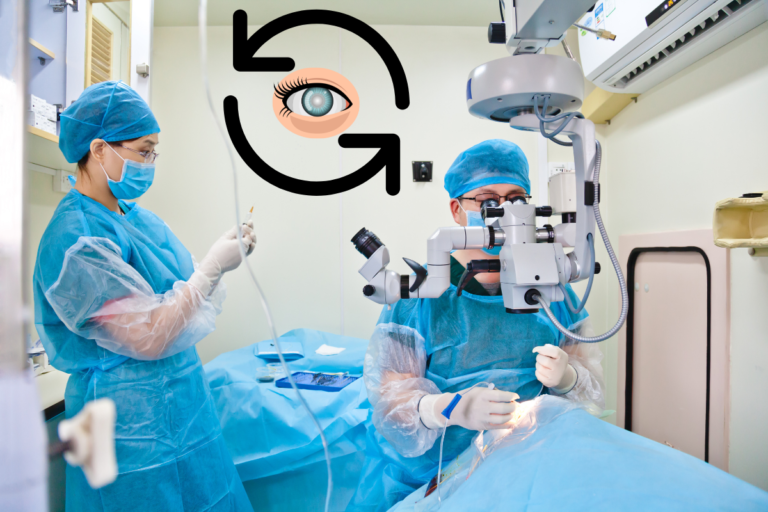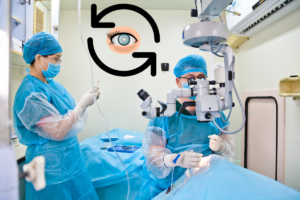Can cataracts return after surgery?

Cataract surgery is one of the most common and successful procedures in modern medicine. However, many patients wonder: Can cataracts come back after surgery? This question arises due to confusion and misinformation. In this blog, we will separate myths from facts and provide clarity on what happens after cataract surgery.
Understanding cataract surgery
A cataract is a clouding of the eye’s natural lens, which affects vision. During cataract surgery, the cloudy lens is removed and replaced with an artificial intraocular lens (IOL). Since the natural lens is replaced, a cataract cannot return in the traditional sense. However, some post-surgery vision changes may cause confusion, leading people to believe their cataract has returned.
Myth #1: Cataracts can grow back after surgery
Fact: Cataracts do not return once removed
Once the natural lens is removed, it cannot become cloudy again. However, some patients experience a condition called posterior capsule opacification (PCO), which can cause blurry vision after cataract surgery. This is sometimes mistakenly referred to as a “secondary cataract,” but it is not a true cataract and is easily treatable.
Myth #2: Blurry vision after surgery means the cataract has returned
Fact: Blurry vision may be due to PCO or other eye conditions
If vision becomes cloudy again months or years after cataract surgery, posterior capsule opacification (PCO) is the most likely cause. This happens when the capsule holding the new lens becomes cloudy due to cell growth. PCO can be quickly and painlessly treated with a YAG laser capsulotomy, restoring clear vision in minutes.
Other conditions like macular degeneration, glaucoma, or diabetic retinopathy may also cause vision problems after cataract surgery, but these are unrelated to cataracts.
Myth #3: You will need another cataract surgery in the future
Fact: Cataract surgery is a permanent solution
Unlike some surgeries that may require repeat procedures, cataract surgery is a permanent solution. Once the cloudy lens is removed and replaced with an IOL, there is no chance of developing another cataract in that eye.
Myth #4: PCO happens to everyone after cataract surgery
Fact: PCO occurs in some patients, but not all
While PCO is a common occurrence, not everyone develops it. Advances in IOL technology and improved surgical techniques have reduced the chances of developing PCO significantly. If it does occur, the YAG laser treatment is quick, painless, and highly effective.
How to maintain clear vision after cataract surgery?
To ensure the best long-term results from cataract surgery, follow these tips:
- Attend follow-up appointments to monitor eye health.
- Protect your eyes from UV rays by wearing sunglasses.
- Maintain a healthy lifestyle to prevent other eye diseases.
- Consult your doctor immediately if you experience changes in vision.
Conclusion
Cataracts do not return after surgery. However, conditions like posterior capsule opacification (PCO) may cause blurry vision and are often mistaken for cataracts coming back. The good news is that PCO is easily treatable, and cataract surgery remains a permanent and highly successful procedure.
If you have any concerns about your vision after cataract surgery, consult our expert ophthalmologists at Krisha Eye Hospital in Ahmedabad. We are here to ensure you enjoy clear and healthy vision for years to come.
Author bio
Dr. Dhwani Maheshwari, an esteemed ophthalmologist with over 10 years of experience, leads Krisha Eye hospital in Ahmedabad with a commitment to advanced, patient-centered eye care. Specializing in cataract and refractive surgery, Dr. Maheshwari has performed more than a thousand successful surgeries. Her expertise lies in phacoemulsification, a technique recognized for its precision in cataract treatment.
Dr. Maheshwari’s educational journey includes an MBBS from Smt. NHL MMC, a DOMS from M & J Institute of Ophthalmology, and a DNB in Ophthalmology from Mahatme Eye Bank Eye Hospital, Nagpur. She also completed a fellowship in phacoemulsification at Porecha Blindness Trust Hospital, further enhancing her surgical skills. In addition to her work at Krisha Eye Hospital, Dr. Maheshwari serves as a consultant ophthalmologist at Northstar Diagnostic Centre.
Under her leadership, Krisha Eye Hospital aims to bring all superspecialties under one roof, offering comprehensive eye care solutions for all vision needs.
FAQs
No, once the natural lens is removed and replaced with an artificial intraocular lens (IOL), a cataract cannot develop again.
Blurry vision after surgery may be due to posterior capsule opacification (PCO) or other eye conditions like macular degeneration or glaucoma. PCO can be treated with a YAG laser procedure.
PCO can develop within months or even years after surgery. The time frame varies from person to person.
No, YAG laser capsulotomy is a painless and quick outpatient procedure that restores clear vision within minutes.
Attending follow-up checkups, protecting your eyes from UV rays, maintaining a healthy diet, and consulting your doctor if you notice vision changes can help maintain clear vision.
































